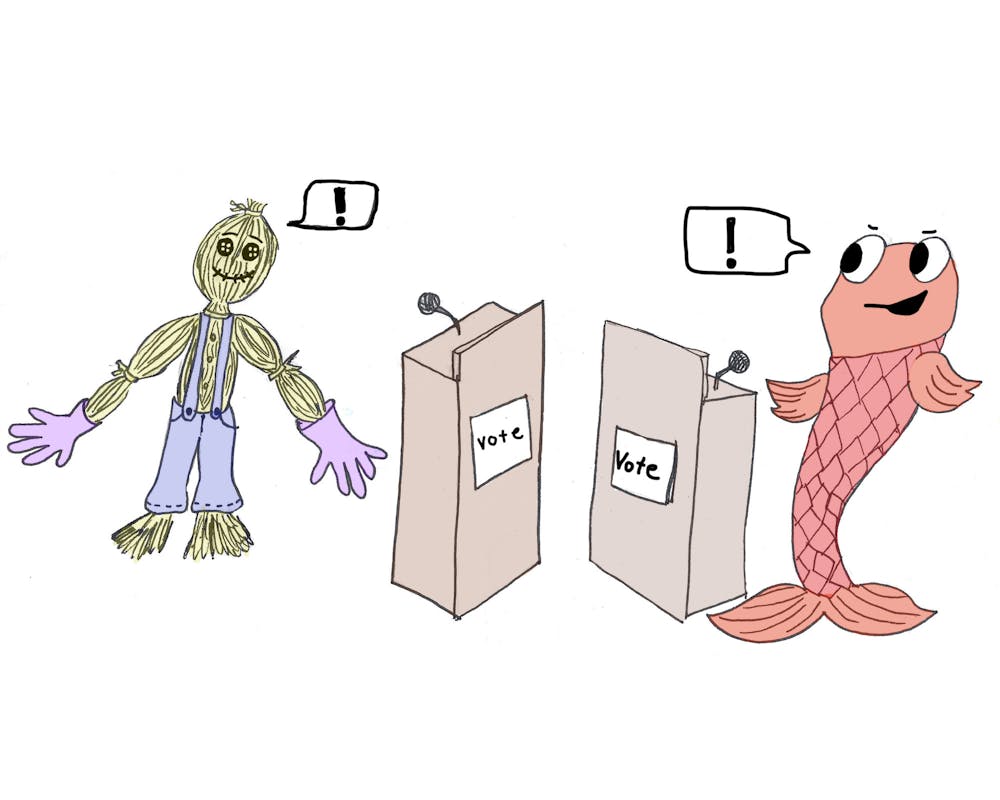On Tuesday, Sept. 10, Vice President Kamala Harris and former President Donald Trump met in person for the first presidential debate between the two candidates. During the debate, both Harris and Trump used more than a few logical fallacies — described in a philosophical context as “reasoning that comes to a conclusion without the evidence to support it,” according to Merriam-Webster.
Straw man
“They have abortions in the ninth month.” — Trump
The straw man fallacy is defined as a weak or imaginary opposition that’s set up only to be easily refuted, according to Merriam-Webster. In other words, one debater creates a figurative “straw man” of their opponent by oversimplifying or concocting a fake version of the opposing argument. They then attack the straw version of their opponent instead of attacking the argument that their opponent is actually trying to make.
When asked about his stance on abortion, Trump pivoted to discussing Harris’ stance.
“Her vice-presidential pick says abortion in the ninth month is absolutely fine. He also says execution after birth — it’s execution, no longer abortion, because the baby is born — is OK,” Trump said.
Moderator Linsey Davis followed this up with a fact-check, informing the former president that there is no state in which a baby can legally be killed after birth.
Minnesota Gov. Tim Walz, Harris’ running mate, signed a bill into law that codifies the right to abortion, according to Axios. Per the state’s abortion protections, the procedure can be done at any time in pregnancy — but only a single third-trimester abortion was reported in the state in 2022, according to Axios.
Trump took the truth — that Walz is in favor of abortion and has allowed late-term terminations — and created a straw version of it: one in which Walz favors the execution of babies.
Red herring
“People start leaving his rallies early out of exhaustion and boredom.” — Harris
A red herring is defined as “something that distracts attention from the real issue,” according to Merriam-Webster. The phrase originates from the process of using the smelly, bright-colored red herring fish on a trail to distract hunting dogs from hunters' piles of kills.
Get content from The Daily Lobo delivered to your inbox
When asked why the Biden administration waited until election year to impose asylum restrictions, Harris instead brought up a different border reform bill that Republicans hadn’t passed. She then pivoted into talking about Trump’s rallies, never addressing the original question.
“You will see during the course of his rallies, he talks about fictional characters like Hannibal Lecter. He will talk about, ‘Windmills cause cancer,’” she said. “And what you will also notice is that people will start leaving his rallies early out of exhaustion and boredom.”
If her goal was to distract the hunting dogs — Trump, in this case — by dangling a fish in front of his face, then mission accomplished.
Appeal to ignorance
“They’re eating the dogs.” — Trump
In his response to Harris’ comment about rally turnout, Trump pivoted further from the original question that moderators had asked Harris. After denying her accusation and accusing her of paying her own audience members to attend her rallies, Trump again brought up immigration.
He claimed that in Springfield, Ohio, immigrants are eating people’s pets.
The appeal to ignorance fallacy occurs “when you argue that your conclusion must be true because there is no evidence against it,” according to Texas State University.
Moderator David Muir informed Trump that according to the Springfield city manager, there had been no credible reports of specific claims of pets being harmed.
“The people on television say, ‘My dog was taken and used for food.’ So maybe he said that, and maybe that’s a good thing to say for a city manager,” Trump responded.
Because the city manager didn’t explicitly prove that nobody was eating dogs, Trump concluded that the claims of the people on television must be true — thus appealing to ignorance.
Ad hominem
“Tim Walz and I are both gun owners.” — Harris
The ad hominem fallacy can take on different forms, according to Scribbr. Most simplistically, it directs an argument at a person instead of at the argument itself — like telling somebody that they’re wrong because they’re ugly.
After Trump accused Harris of planning to confiscate everybody’s guns, Harris made a rebuttal.
“Tim Walz and I are both gun owners,” she said. “We’re not taking anybody’s guns away.”
It’s debatable which type of ad hominem fallacy this is, but it’s clear she’s arguing that she won’t take a certain action because of who she is as a person. Although her two statements are loosely related, it isn’t inherently true that just because she owns a gun, she won’t take anybody else’s away.
Lauren Lifke is the managing editor for the Daily Lobo. She can be reached at managingeditor@dailylobo.com or on X @lauren_lifke
Lauren Lifke is the managing editor for the Daily Lobo. She can be reached at managingeditor@dailylobo.com or on Twitter @lauren_lifke






